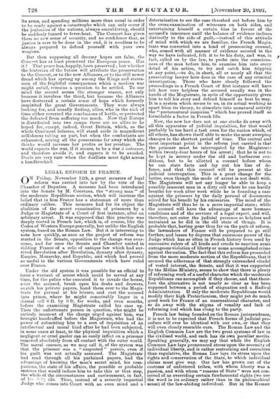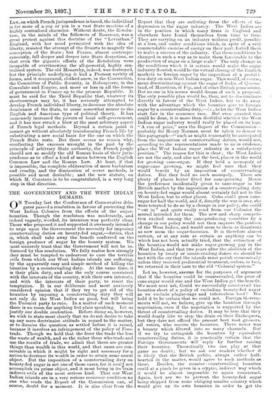LEGAL REFORM IN FRANCE.
ON Friday, November 12th, a great measure of legal reform was carried into law by the vote of the Chamber of Deputies. A measure had been introduced into the Senate by M. Constans, the " strong man " of the moderate Republican section, which will increase the belief that in him France has a statesman of more than ordinary calibre. This measure had for its object the abolition of the secret examination of prisoners by a Judge or Magistrate of a Court of first instance, after an arbitrary arrest. It was supposed that this practice was deeply rooted in French law, which is, of course, like the Codes of Western Europe generally, but unlike the English system, based on the Roman Law. But it is interesting to note how quickly, as soon as the project of reform was started in the Senate, opposition to the change was over- come, and for once the Senate and Chamber united in ridding France of a relic of antique law which had sur- vived Revolution after Revolution, dynasty after dynasty, Empire, Monarchy, and Republic, and which had proved so useful to the various Governments which have ruled over France.
Under the old system it was possible for an official to issue a warrant of arrest which could be served at any time, for the police who executed it to invade the house, size the accused, break open his desks and drawers, snatch his private papers, hand them over to the Magis- trate for perusal at his leisure, and cast the accused into prison, where he might conceivably linger in a dismal cell 6 ft. by 3 ft. for weeks, and even months, before the examining Magistrate called his case up. Then the unfortunate person in question, who might be entirely innocent of the charge urged against him, was brought handcuffed before the Magistrate, who had the power of submitting him to a sort of inquisition of an intellectual and moral kind after he had been subjected, in some cases at least, to the physical inquisition which a negligent or cruel gaoler can so easily inflict on a prisoner removed absolutely from all contact with the outer world. The moral essence, as we may call it, of the system was that the prisoner was a " suspected " person, even if his guilt was not actually assumed. The Magistrate had read through all his purloined papers, had the advantage of knowing the man's secret mind, his com- panions, the state of his affairs, the possible or probable motives that would induce him to take this or that step, the whole of the circumstances and environment, in fact, of his .i.,ity life. Thus, instead of a severely impartial Judge who comes into Court with an even mind and a determination to see the case threshed out before him by the cross-examination of witnesses on both sides, and entertaining himself a certain bias in favour of the accused's innocence until the balance of evidence inclines distinctly to the side of guilt,—instead of this attitude of mind with which we are familiar, the French Magis- trate was converted into a kind of prosecuting counsel, who, armed with all manner of evidence secured in the way we have indicated, felt it to be his duty, and was, in fact, called on by the law, to probe into the conscious- ness of the man before him, to examine him into every detail of his action, to try and catch him tripping at any point,—to do, in short, all or nearly all that the prosecuting lawyer here does in the case of any criminal investigation. Those who have closely followed the proceedings in a French Court of first instance will have felt how very helpless the accused usually was in the hands of the Magistrate, in spite of the opportunity given him to tell his story and defend himself as best he may. It is a system which seems to us, in its actual working as apart from its theory, to stimulate into unnatural activity the " preternatural suspicion " which has proved itself so formidable a factor in French life.
Now, the new law does not at one stroke do away with all this apparatus of judicial inquisition, for that would probably be too hard a task even for the nation which, of all others, has shown itself able to make the most sweeping changes in the shortest period of time. The central and most important point in the reform just carried is that the prisoner must be interrogated by the Magistrate within twenty-four hours of his arrest ; that he is not to be kept in secrecy under the old and barbarous con- ditions, but to be allotted a counsel before whom he can state facts and lay out his line of de- fence, and that this counsel will be present at the judicial interrogation. This is a great change for the better, even though the mode of arrest is not dealt with. The Magistrate will not any longer be able to keep a possibly innocent man in a dirty cell where he can hardly breathe for week after week while he is founding a case against the prisoner by the daily perusal of documents seized for his benefit by his emissaries. The mind of the Magistrate will thus be in a more impartial state ; while the accused will have the advantage of more humane conditions and of the services of a legal expert, and will, therefore, not enter the judicial presence so helpless and untrained as he did in the old state of things. It is probable that, having gone thus far on the path of reform, the lawmakers of France will be prepared to go still further, and lessen by degrees that enormous power of the Judge which has so often in French history been used by successive rulers of all kinds and creeds to sanction some outrageous violation of liberty or some accomplished crime against the nation. The fact that this reform has proceeded from the more moderate section of the Republicans, that it secured the adherence of that strongly entrenched citadel of vested interest, the Senate, and that it was supported by the Meline Ministry, seems to show that there is plenty of reforming work of a useful character which the moderate Republicans can accomplish if they choose, and that there- fore the alternative is not nearly so clear as has been supposed between a period of stagnation and a Radical Administration. If only the moderate Republicans would modify their high Protectionism, they might yet do much good work for France of an unsensational character, and so do away with the stigma of venality and lack of reforming zeal which has clung to the party.
French law being founded on the Roman jurisprudence, it is not to be expected that French forms of judicial pro- cedure will ever be identical with our own, or that they will even closely resemble ours. The Roman Law and the English Common Law are the two great systems of law in the civilised world, and each has its own peculiar merits. Speaking generally, we may say that while the English Common Law lays pronounced stress upon the necessity of individual liberty, and is rather restraining and corrective than regulative, the Roman Law lays its stress upon the rights and conservation of the State, to which individual claims must give way. Our law has grown out of the customs of unfettered tribes, with whom liberty was a passion, and with whom "reasons of State" were not con- ceived of as overriding certain fundamental rights (we use the word in its ordinary rather than in its philosophical sense) of the law-abiding individual. But in the Roman Law, on which French jurisprudence is based, the individual is far more of a cog or pin in a vast State machine of a highly centralised character. Without doubt, the Revolu- tion, in the minds of the followers of Rousseau, was a great protest against this doctrine of the "Leviathan." England, with her mind permeated with the idea of liberty, resisted the attempt of the Stuarts to magnify the conception of the State ; but France, almost contempo- raneously, fell deeper and deeper into State despotism, so that even the gigantic efforts of the Revolution were incapable of overthrowing the all-powerful, highly cen- tralised system. The old Monarchy, indeed, was destroyed, but the principle underlying it had a Protean variety of forms, and it reappeared, clothed anew, in the Convention, the Committee of Public Security, in Robespierre, in the Consulate and Empire, and more or less in all the forms of government in France up to the present Republic. It must be said for the Third Republic that, whatever its shortcomings may be, it has seriously attempted to develop French individual liberty, to decrease the absolute dominance of the State, to come somewhat nearer to the English and American type of political theory. It has immensely increased the powers of local self-government, and it has now struck a blow at the most arbitrary aspect of French legal methods. Beyond a certain point it cannot go without absolutely transforming French life by substituting a new social basis for the one on which the French State rests. But there seems no reason why, recollecting the excesses wrought in the past by the principle of arbitrary State authority, the French people should not so modify the old Roman basis of their juris- prudence as to effect a kind of mean between the English Common Law and the Roman Law. At least, if that is impossible, the complete obliteration of mere barbarism and cruelty, and the diminution of secret methods, is possible and most desirable ; and the new statute, on which M. Constans is to be congratulated, is a very long step in that direction.























































 Previous page
Previous page